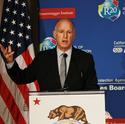Jerry Brown’s long political career will likely end in January 2019, when the 80-year-old’s second stint as California governor concludes. In the media’s eyes—and in his own mind—Brown’s gubernatorial encore has been a rousing success. read more »
Policy
French President Takes on Socialized Trains
They say Millennials are rejecting capitalism and are drawn to socialism. It’s hard to imagine why, as nearly all the problems they face are caused by bad government policies, not selfish entrepreneurs. read more »
- Login to post comments
Trump’s Opposition To Unrestricted Globalism Might Prove a Historical Necessity
Let’s stipulate that Donald Trump is a vulgar, ignorant and often reckless narcissist. Yet he also may well prove a historical necessity, someone who, intentionally or not, has rendered apart a bi-partisan consensus well past its usefulness. read more »
- Login to post comments
Amtrak in Turmoil
The Antiplanner isn’t alone in suggesting that hiring an airline executive to run Amtrak is a bad idea (at least for Amtrak). Last week, a former Amtrak official (who wishes to remain anonymous) sent a letter to Maryland Senator Chris Van Hollen asking that former Delta CEO Richard Anderson be fired from his current job as CEO of Amtrak. read more »
- Login to post comments
Poverty is Worse than Sprawl: California's Housing Affordability Crisis
Rent control supporters in California recently announced that they have enough signatures to qualify a state proposition to remove limitations on municipalities to control rents. Their purpose is to improve housing affordability in the nation’s most unaffordable state. However, should the proposition pass, the net effect is likely to be less new rental housing, as investors are likely to flee the market, as they routinely have before. read more »
- Login to post comments
New Localism and Old Institutions
Last week I posted an article talking about the maturity curve, or the lifecycle arc from incubation to growth to maturity to decline that applies to so many things. And this weekend my review of Bruce Katz and Jeremy Nowak’s book The New Localism was published in the New York Times Book Review. These two items are related. read more »
- Login to post comments
Giving Common Sense a Chance in California
In California, where Governor Jerry Brown celebrates “the coercive power of the state” and advocates “brainwashing” for the unanointed, victories against Leviathan are rare. Yet last week brought just such a triumph, as a legislative committee rejected an attempt by San Francisco state senator Scott Wiener to take zoning power away from localities in areas within a half-mile of a bus or train stop. read more »
- Login to post comments
Shovel Ready
Many years ago I remember a television commentator saying more Americans have outhouses than computer connections. This was in the early days of dial up modems. He seemed to suggest that household computers were little more than Japanese video games, which was actually true at the time. Well, thirty years have passed and this afternoon I received a package for one of my neighbors. Evidently he ordered a shovel on the interwebs. read more »
Nashville’s Hopeless Rail Transit Proposal
Nashville is the 36th largest metropolitan area in the nation, having long since passed historic Tennessee leader Memphis. Nashville was the 10th fastest growing major metropolitan area in 2017. At the current growth rate Nashville will reach 2 million residents by the 2020 census and seems likely to pass slower growing San Jose soon after. read more »
- Login to post comments
The High Speed Rail 2018 Business Plan – A Classic Model Of Deception
The California High Speed Rail Authority has released its 2018 Business Plan. It portends to finally reveal the true cost for construction of Phase I of the project. The new cost estimate is at a base of $77.3 billion to a possible $98.1 billion dollars. Completion of Phase I is now projected for year 2032. Please remember the old promise to the voters was the project would be running by 2020 and the cost to California voters would be $10 billion (the rest of the $32 billions needed to build Phase I would come from Federal and private sources). read more »
- Login to post comments





















